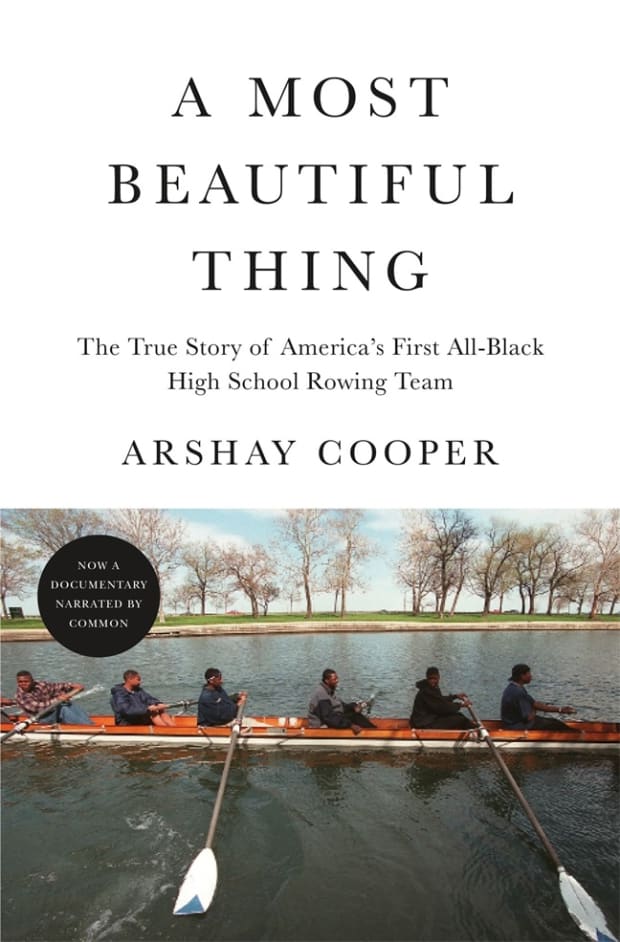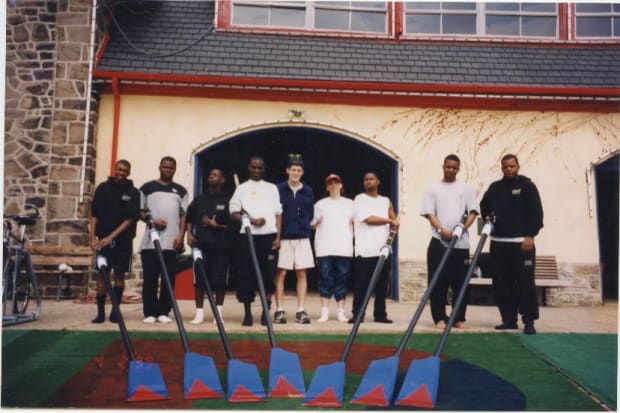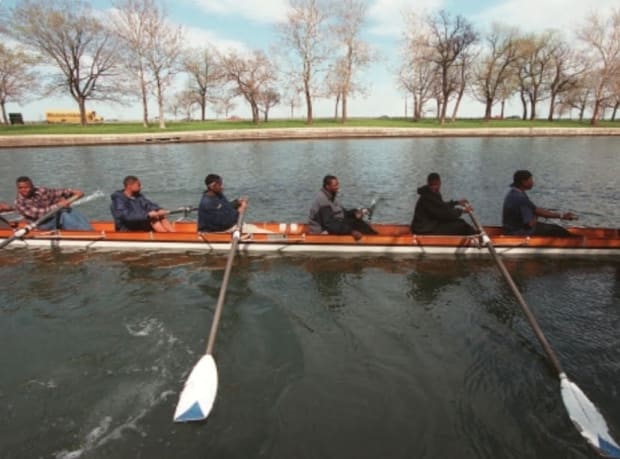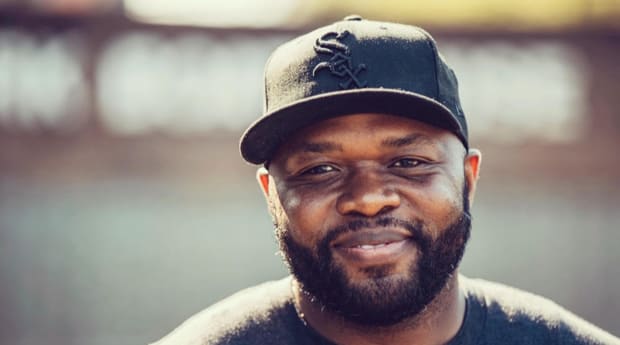Arshay Cooper, author of "A Most Beautiful Thing," details his experience rowing crew with teammates from rival neighborhoods on the first all-black high school rowing team in the United States and how the book and forthcoming documentary can be used as a tool for social change today.
Growing up on Chicago’s West Side in the 1990s, Arshay Cooper wasn’t interested in playing basketball or football like most high schoolers his age. Instead, he escaped the violence on the streets and found his own source of “pure meditation” through a sport that was unusual and unknown in his neighborhood: crew.
In 2015, Cooper self-published a memoir called Suga Water, chronicling his experience rowing crew with teammates from rival neighborhoods and gangs on the first all-Black high school rowing team in the United States. Cooper details how he and his teammates experienced racism and discrimination in the community around the boathouses the team traveled to and how they took a risk in trying a mostly all-white sport that had never seen anyone like them before—and how it ultimately transformed his life.
On June 30, the book is being re-released with a new title, A Most Beautiful Thing, and a feature-length documentary with the same title—narrated by artist Common and executive produced by Common, Grant Hill, Dwayne Wade and producer 9th Wonder—will be released in July. Sports Illustrated caught up with Cooper, who is now a chef in New York, to learn more about his experience rowing crew and how it changed his life; how he helps other kids find the sport today; how the book and documentary can be used as a tool for social change today and much more.
The following interview has been lighted edited for length and clarity.

Jamie Lisanti: How did you discover crew? It was such an unknown sport to you, but why was it so appealing? Had you ever thought about joining other sports at the school?
Arshay Cooper: Of course, it was like Chicago in the ’90s, and it was all about basketball. Everyone carried a basketball to school every day. And I wasn't great at basketball or football, and I think when I played basketball or tried out for the football team, it triggered a lot of just trauma growing up. I was upset every time I played football. I wanted to hurt somebody, as a way to release. It just wasn't my sport. For a lot of people, it's great, it's helpful. But for me, I just didn't like the way it made me feel.
I was walking in the lunch room one day, and I see this lady and this boat in the lunch room. And I was like, what the hell is this? And this white woman tapped my shoulder and said, Would you like to join a crew? I had no idea what it was. And then I looked they had this TV monitor behind the boat and I see all white people rowing at the Olympic Games. So I said no. And I remember just walking away from her. It was like: We don't even swim at this school, and you're gonna put us on a shell rowing across the river?
And then the next day they were still in the lunch room and there was a sign, and it says, FREE PIZZA, SIGN UP FOR ROWING, and I was like, O.K., O.K., maybe we can just go for the pizza, you know, and the guys talked me into going up there. And I think what really attracted me to the sport is that when this man spoke about the sport—crew is one of those sports where there are not a lot of teams in each city. And the goal was not states; the goal was nationals. So you maybe race once in your city, and every other race is in another state, in another city. And I had never been anywhere. And I was like, Wow, we get to travel all year round. I get a chance to just leave for a little bit. And also just like learning how to swim, learning water confidence that one day you can enjoy the water.
And I think the last thing that really, before you even try it out, that I really loved about the sport is the way he explained that there are no cheerleaders, there are no million-dollar contracts after college, there's no bus load of fans. But the people who show up every day are those who strictly are there to go to college or there for themselves. And I didn't have a lot of friends, and that's the kind of people I needed in my life, and so that really caught my attention.
And so I tried it out and I remember it was rough at first, but like being on the water, away from the police sirens, street noise, the broken street glass and the downtown view right in downtown Chicago where you can't talk, you just row. And it was almost like, if there's a storm or if you're in the shower by the ocean, it was just peaceful, and it was the only sport that really didn't trigger me—it wasn't a combat sport or conflict sport. It really just helped me heal. It's pure meditation—the rhythm, the water. And so it really helped me.
JL: What drew you to want to be on—and stay on—the team? What was the group like at first? What were practices like? Some of the team members were in rival gangs, right?
AC: Yeah, people were segregated by their communities, by the gangs, like we would be in the gym room sitting on the rowing machines and people just hung out with their crew. You can look at the coach's face and they are like, How are we gonna fix this? I think once we started swimming, once we started doing these swim lessons, it was still the same way. Then we got on the boat, and it was really kind of just making fun of each other or, you know, calling each other names. But once we sat in that boat and got pushed off, everyone was afraid. That was like, no being tough. I remember yelling out, You guys hear gun shots all day long, and now everybody's scared. And everyone laughed, and it kind of broke the ice a little bit. But it was like we all were at a point where we weren’t in our community, the boat house was downtown and there was no one to call on. It was like just complete fear. And we knew to be safe, to get back to this dock, that we had to work together. We had to shut up and we had to listen.

Thank God our coach understood youth development and was able to talk about unity, who we are, our values, recasting the narrative and saying we belong in this sport. That was the only time that we can really listen, because if we don't, we can go under. And those moments were what really connected us. And then once we started racing or going to regattas—remember, the competitors were white. The volunteers were white. The coaches were white. The parents were white. The photographers were white. Everyone was white. And it was just us. There was no one else to count on. There was no one else to talk to but each other. And I think that's where we started to say, hey, listen, we got to get along. We got to make this work. You know what I mean? And we understood, we just had the feeling that people was watching us. Many people wanted us to lose, and we started talking and said we have to pull for each other. And it was those long, long van rides to different cities that helped us to break the ice and to learn more about each other and know that we are all the same. We grew up the same. We had the same struggles. And it was those moments of coaches leading us into discussion where we started to get to know each other and slowly start noticing that those who were hanging out in the gangs started showing up at practice every day and made a different decision. And that's just the beauty of being able to compete, to travel, to see a different world. That really allowed us to connect with each other.
JL: As an all-Black team, you experienced discrimination and racism in a sport that was almost all white. How did you deal with that? And now as you look back on those experiences, how do you feel that this sport and the experiences helped prepare you for your futures?
AC: For us, our coach was a good man with a wife who was training to be and in school to be a civil rights attorney. And she was really instrumental in our lives, and I think that they understood the systemic racism. They understood that the community we live in and a little bit of history behind it. And we were not only prepared for race days, but we would prepare for race issues. Showing up at these regattas—Preston, one of the guys on the team called it like, people looked at us like we were contagious. But more stuff happened not at the regattas but outside of the regattas, being in the cities that we were in, trying to get into the restaurant where they won't let us in the restaurant. Oh, we don't let kids in with these clothes. And we see white kids those kind of clothes. The lesson rowing taught us was really about pushing forward, trusting each other and investing back in young people. So our program wasn't tutoring or rowing, it was strictly rowing and youth entrepreneurship. So we had youth entrepreneurship classes while we were in this program and in there, that's where we learned about what's in our community and how to give back in our community and what resources are needed in that community and what can we do to contribute to that.
And it wasn't about being a fast boat, it was really about being a great human first and contributing to our community. And then fast boats. And so that helped us a lot. So being in the class, learning how to shake hands, learning how to network with people who don't look like us and showing up at races and working hard. Work ethic, team building. Knowing our community, knowing who we are. Our values really helped us to live a great life outside of the boat.

Someone asked me a question at the U.S. rowing convention. They said, How many of you guys on your team went on to be Olympic rowers? Or college rowers? I'm like, none. But 90% of my team are entrepreneurs and hire people from the community. That was always the goal, to use the sport of rowing to make an impact in ourselves and in the neighborhood. And those lessons, it's like, to get somewhere fast, to really win, don't do the work of eight people, find eight people to do the work. That was always our lesson inside the boat, and that was always our lesson outside the boat. To be flexible—to go forward as far as you can, you have to be flexible in the boat, and in the same way, you have to be flexible outside the boat. There's going to be trials, there's going to be run-ins with the police. There are gonna be people doubt you, looks at you, stares at you. But we adapted. When troubles happened, we adapted.
We learned all these lessons inside of crew and outside of crew. And so that's how we were able to just really be successful men. And we are still close friends today. We raced last year and we brought together many communities of Chicago to come see us race and hear our stories. And it was impactful. And I think, we would never have spoken to each other if it was any other sport. It was that sport and it was being alone and isolated and feeling that way in order for us to connect and understand that there's more. And also we understood privilege. Like, we were in our bubble, but we saw kids like, pulling up in nice cars and those were kids that were from the other side of the river. They had well-funded teams. They had the best coaches. And that's the river that we worked hard to try to cross every day in life, that same river.
JL: What made you want to write this book about you and your team's experience? Did you mean to use the book to enact change in society? And now, how do you feel your story can help push forward the conversations we’re all having now?
AC: I spent a lot of time, before I was writing this book, speaking at schools. And I was a culinary chef in school, and a lot of questions were the same questions from young Black men and women: How do you live here in a community that's neglected or mistreated, where there's no resources, when maybe your dad's not at home or maybe your parents are not around or working three jobs and don't have a lot of time? How do you live there and become successful? Those were the questions I'd get every day. How do you do it? How do you avoid the gangs? How do you avoid different things in this community? How did you do it, Arshay? And my way was crew. Kids would ask those questions all the time, and I wanted not only to give the answers of my way, through my voice, but through my writing and my experience.
I also wanted the world to know about situations with the cops. In the documentary, all these things happened with the different communities and different gangs. And I was like, wait: The biggest disconnect is the Black community and the police officers. We have to go through this in this documentary. And I tell the story of, as a kid I grew up and everyday we had go to school and we had to pledge allegiance to the flag. And then I had to recite the preamble. I had to learn the Constitution. I remember being stressed because I had to recite the Declaration of Independence in front of the whole class. We wore Fourth of July shirts, and I go to my first baseball game and I remember singing the national anthem with chills up my spine.
And then, I started rowing. We started having a great time. But we started interacting with kids that don't look like us. And my coach, a white coach, became a great person in my life. And I started meeting kids from the other teams that became friends. So I've done all these great things. I never committed a crime, but still had my face pressed on a police car numerous times. First time it happened, I was with my friends that weren't on the team but they were from school, and I had a cop put his hand down my pants and ask where the drugs was at.
If you've ever been touched by a stranger, it starts a riot inside of you. It may not happen right away, but it's inside of you, like you are angry. So every time you see something happen to a Black man, you see your trauma. You see yourself. You see your experience. And I thought as a young person, like maybe it's just because this community is a little rough. But when I started hanging out with other guys in the suburban neighborhoods who rowed, and I leave the house from playing video games at 8:00 at night, the police were still pulling me over, looking through my backpack, asking me what I'm doing in that neighborhood and searching my bags.

So the next time I went to a baseball game and I see everyone singing this national anthem song and I'm like, How can I even sing this song? I live in a different America. The white guys I met who rowed had never experienced what I had experienced. They live in a different country where they can sing this song and I can't. And I've done it all. I pledge allegiance to the flag. I was born here. And so that triggered a lot of trauma to a point that even my friends, who are as legit as possible, still freak out when a cop car is behind them. And so in the documentary, it took me towards the end of the book, I reached out to cops in a documentary and Chicago police officers, white cops, and I asked them to come out for a row.
And at first my friends were like, Do you really want to do that? And I was like, yeah, I want to do that. We all had a bad experience, but I want to invite them out to row. I mean, they're gonna work here. They're gonna work in our village. We know it takes a village to raise a child. We got schools, community centers and grandparents and barbers raised in the village and they are going to be in this village, and they were killing kids in our village, not raising kids in our village. And so I wanted to have a conversation. I wanted them to know our names. They are here every day and they don't know our names. And so they showed up, and it was a little awkward at first, and we said, we are here to teach you how to row. I knew that I couldn't just walk into a police station and ask to have a conversation with a group of cops. I knew I couldn't just send my books and they were going to read it. I knew I wasn't gonna say this documentary is going to come out and they would watch it. I knew that sports unite people. And if I can say we want you guys to do a sport with us and try the sport, then maybe they will come. And they came.
My reason for that was that I wanted the cops to hear my story that I told you. I wanted the cops to see that Malcolm on the team calls his son every 10 minutes. That people care about these kids in the community. I wanted them to see that [one teammate] Preston wears a hoodie and saggy pants, but he's still one of the best entrepreneurs in the community and he cuts hair for free on Sundays. So I wanted them to know that our other teammate, Alvin, has been locked up before, but you know what? He now has a company and he hires everyone from that community. They met our kids, and the second time we rowed, we asked them to bring their kids. At the boathouse, I wanted them to see that the white kids show up in their Ubers and then the Black kids come with their backpacks and their big bags from the train and they're walking and they show up and they work hard. I wanted to recast the narrative. I wanted them to see who we are and who the people who live on the West Side and in the neighborhood they're policing, because they don't interact in that way with folks from our community. And they learned. And at the end, we raced with them and they met our families. And I said, listen, here's the challenge. The boathouse is free for kids. If you see a kid that's on edge or you want to pull over and talk to them, send them to the boathouse. Can you make that commitment? And they made that commitment. I wanted them to see that every young person they stop or they see, that they see our face. I'm constantly texting them like, You see what happened with George Floyd. What are your thoughts? And that's just my way, you know.
It doesn't change the system. But you know to me it's a start to just really start a conversation and know who we are. And that's what I did in film. And that's what I want these cops to know, that we love ourselves, we love our kids, and we are trying to raise these kids in our village. And we don't need you just policing them, but understanding the history of this country and what happened to our communities.